Public Administration and Political Science \ 1-2

The city of Jerusalem, which is considered sacred by Muslims, Christians and Jews, dates back to BC. It has an ancient history dating back to the 4000s. The dominance of states belonging to these religions in Jerusalem for different periods paved the way for the formation of holy places belonging to three religions in the city.
Various zoning activities carried out by the state in Jerusalem, which came under Ottoman rule in 1517, increased the quality of life of the city. One of the breaking points for Jerusalem in this period of domination that lasted until 1917 was the process that started with the French occupation of Egypt in 1798 and continued until the end of the Kavalalı Mehmed Ali Pasha rebellion in 1841. The emergence of the troubles in different parts of the state, such as the Wahhabi and Greek rebellions, in this time period, caused Jerusalem to be indirectly affected by these events, since it hosted different nations together.
In this study, which deals with the policy of the Ottoman Empire in Jerusalem between 1798-1841, the political events and administrative changes, the prominent activities in the approach of the state to Muslims, the rights granted by the state to non-Muslims and the ways of communication of the people with the state are examined.
Various zoning activities carried out by the state in Jerusalem, which came under Ottoman rule in 1517, increased the quality of life of the city. One of the breaking points for Jerusalem in this period of domination that lasted until 1917 was the process that started with the French occupation of Egypt in 1798 and continued until the end of the Kavalalı Mehmed Ali Pasha rebellion in 1841. The emergence of the troubles in different parts of the state, such as the Wahhabi and Greek rebellions, in this time period, caused Jerusalem to be indirectly affected by these events, since it hosted different nations together.
In this study, which deals with the policy of the Ottoman Empire in Jerusalem between 1798-1841, the political events and administrative changes, the prominent activities in the approach of the state to Muslims, the rights granted by the state to non-Muslims and the ways of communication of the people with the state are examined.

In this book, 47 analyzes published in Russian on TRT Russian channel in 2018 were brought together and presented in Turkish. In these analyzes, economic and military developments, especially the political events that developed between Turkey and Russia throughout 2018, were interpreted. In this sense, ideas and opinions that will guide the relations between the two countries have been discussed.
This work is a continuation of the book that previously dealt with the developing relations between Russia and Turkey between the years 2016-2017. In this work, the events that developed between the two countries in 2018 were written in Turkish and Russian in the form of analyzes. In order to understand these works, “Is a Turkey-Russia Eurasian Pact Possible?” We recommend that you also read our work.
The military-technological cooperation between Russia and Turkey, apart from the developing economy in Syria, marks a new era for NATO member Turkey as well as for other members. We should say that Turkey, which could not get enough support from its NATO allies in this state, is making efforts to ensure stability in its region, especially its own security, in cooperation with Russia. As long as the harsh policies of the USA against Turkey continue, this cooperation seems to develop further. Considering NATO's concerns regarding this cooperation, it may be possible to establish a new security-based bloc in Eurasia in the future. This process is under the initiative of NATO-USA on the one hand and Turkey on the other.
Turkey's purchase of the S400 air defense system indicates a significant change and opposition not only for Turkey but also for the whole world, which has become dependent on the USA. We hope that such works will be useful in order for these two states and societies to better understand each other.
This work is a continuation of the book that previously dealt with the developing relations between Russia and Turkey between the years 2016-2017. In this work, the events that developed between the two countries in 2018 were written in Turkish and Russian in the form of analyzes. In order to understand these works, “Is a Turkey-Russia Eurasian Pact Possible?” We recommend that you also read our work.
The military-technological cooperation between Russia and Turkey, apart from the developing economy in Syria, marks a new era for NATO member Turkey as well as for other members. We should say that Turkey, which could not get enough support from its NATO allies in this state, is making efforts to ensure stability in its region, especially its own security, in cooperation with Russia. As long as the harsh policies of the USA against Turkey continue, this cooperation seems to develop further. Considering NATO's concerns regarding this cooperation, it may be possible to establish a new security-based bloc in Eurasia in the future. This process is under the initiative of NATO-USA on the one hand and Turkey on the other.
Turkey's purchase of the S400 air defense system indicates a significant change and opposition not only for Turkey but also for the whole world, which has become dependent on the USA. We hope that such works will be useful in order for these two states and societies to better understand each other.

Who Will Own the Space in the Information Age?
We have been hearing for a long time: Turkey will be among the top 10 economies in the world. This; a challenging target! How will that be? The main argument of this book is this: If this country wants to enter the top 10, it must increase its human capital; By realizing the Human Development Index (HDI) and Good Governance criteria, education, justice, business ethics, social reconciliation, etc. He should rise by treating himself in matters.
Where do you think we are in HDI?
We, as the young writers of Istanbul Medeniyet University, embarked on a struggle; We did this project to show that young people can enter the system earlier and vaccinate the youth when they are given “result-oriented-not memorized-benefit-generating” training and responsibility.
This book, which chooses the 15-45 age range as its main target audience; does not explore space, but emphasizes the relentless importance of space!
Technological transformation from the perspective of International Relations, soft power analysis, popular culture, global reports, digital media, economic reflections and mental health are the main topics of the book.
We have been hearing for a long time: Turkey will be among the top 10 economies in the world. This; a challenging target! How will that be? The main argument of this book is this: If this country wants to enter the top 10, it must increase its human capital; By realizing the Human Development Index (HDI) and Good Governance criteria, education, justice, business ethics, social reconciliation, etc. He should rise by treating himself in matters.
Where do you think we are in HDI?
We, as the young writers of Istanbul Medeniyet University, embarked on a struggle; We did this project to show that young people can enter the system earlier and vaccinate the youth when they are given “result-oriented-not memorized-benefit-generating” training and responsibility.
This book, which chooses the 15-45 age range as its main target audience; does not explore space, but emphasizes the relentless importance of space!
Technological transformation from the perspective of International Relations, soft power analysis, popular culture, global reports, digital media, economic reflections and mental health are the main topics of the book.
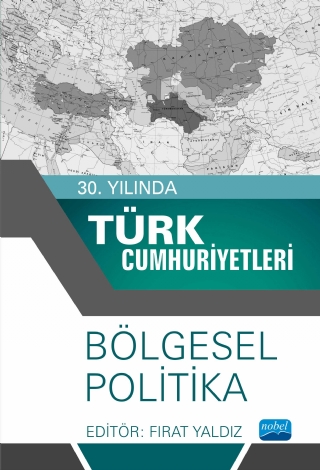
In the 30th Anniversary of their Independence, the Turkic Republics book series has emerged as a result of the valuable efforts of expert writers. In this three-book series, the 30-year journey of the Turkic Republics was analyzed thematically and holistically, not through states but over subjects. As a matter of fact, there was a need to analyze the Turkic Republics on a national, regional and global scale in terms of temporal and spatial context, both in Turkey and in Turkish. In the second book of the Turkish Republics in the 30th Anniversary of Independence book series titled Regional Politics; "Regional Cooperation Between Turkic Republics", "Challenges Faced by Multilateral Cooperation and the Increasing Importance of Regional International Organizations: The Example of the Turkic Council", "Regional Security in Turkic Republics", "Turkic Republics and Energy in the 30th Anniversary of Their Independence", "Turkish "The Past and Present of Environmental Problems in the Turkish Republics", "Language and Alphabet in the Turkic Republics", "Searching for a Common History in the Turkic Republics", "An Overview of the Literatures of the Turkic Republics during the Independence Period" are included. With the Introduction and Conclusion sections of the book, Regional Policy gets a holistic framework.
The book series of Turkic Republics in the 30th Anniversary of their Independence is a contemporary contribution to the literature on the Turkic Republics… Arousing curiosity and excitement in young researchers, encouraging new studies… Contributing to the future of the Turkic Republics, their role in the global system, 50th and 100th anniversary in the hope…
The book series of Turkic Republics in the 30th Anniversary of their Independence is a contemporary contribution to the literature on the Turkic Republics… Arousing curiosity and excitement in young researchers, encouraging new studies… Contributing to the future of the Turkic Republics, their role in the global system, 50th and 100th anniversary in the hope…
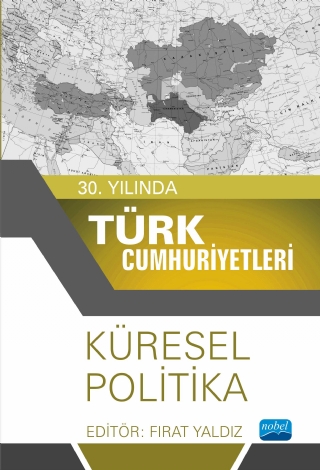
In the 30th Anniversary of their Independence, the Turkic Republics book series has emerged as a result of the valuable efforts of expert writers. In this three-book series, the 30-year journey of the Turkic Republics was analyzed thematically and holistically, not through states but over subjects. As a matter of fact, there was a need to analyze the Turkic Republics on a national, regional and global scale in terms of temporal and spatial context, both in Turkey and in Turkish. In this first book of the Turkish Republics in the 30th Anniversary of Independence book series titled National Politics; “National Identities and Social Structure”, “Understanding and Explaining the Transition, Change and Transformation Processes of Turkic Republics”, “Macro-Economic Structure and Sectoral Analysis of Turkic Republics”, “Migration from Past to Present in Relations between Turkey and Turkic Republics”, “Turkish There are "Religion in the Turkish Republics", "Media in the Turkic Republics" and "Tourism in the Turkic Republics" sections. With the Introduction and Conclusion sections of the book, National Policy gets a holistic framework.
The book series of Turkic Republics in the 30th Anniversary of their Independence is a contemporary contribution to the literature on the Turkic Republics… Arousing curiosity and excitement in young researchers, encouraging new studies… Contributing to the future of the Turkic Republics, their role in the global system, 50th and 100th anniversary in the hope…
The book series of Turkic Republics in the 30th Anniversary of their Independence is a contemporary contribution to the literature on the Turkic Republics… Arousing curiosity and excitement in young researchers, encouraging new studies… Contributing to the future of the Turkic Republics, their role in the global system, 50th and 100th anniversary in the hope…
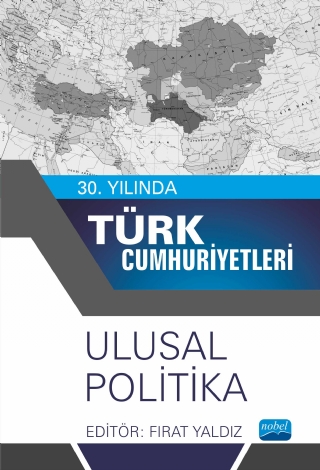
In the 30th Anniversary of their Independence, the Turkic Republics book series has emerged as a result of the valuable efforts of expert writers. In this three-book series, the 30-year journey of the Turkic Republics was analyzed thematically and holistically, not through states but over subjects. As a matter of fact, there was a need to analyze the Turkic Republics on a national, regional and global scale in terms of temporal and spatial context, both in Turkey and in Turkish. In the third book of the Turkish Republics in the 30th Anniversary of Independence book series titled Global Politics; "Turkic Republics and Turkey", "Russia's CIS Policy and Turkic Republics", "Turkic Republics - People's Republic of China Relations", "Iran's Policies of Turkic Republics", "Turkic Republics and American Foreign Policy", "European Union" 's Relations with the Turkic Republics in the Framework of the Eastern Partnership and Central Asian Policies". With the Introduction and Conclusion sections of the book, Global Politics gains a holistic framework.
The book series of Turkic Republics in the 30th Anniversary of their Independence is a contemporary contribution to the literature on the Turkic Republics… Arousing curiosity and excitement in young researchers, encouraging new studies… Contributing to the future of the Turkic Republics, their role in the global system, 50th and 100th anniversary in the hope…
The book series of Turkic Republics in the 30th Anniversary of their Independence is a contemporary contribution to the literature on the Turkic Republics… Arousing curiosity and excitement in young researchers, encouraging new studies… Contributing to the future of the Turkic Republics, their role in the global system, 50th and 100th anniversary in the hope…
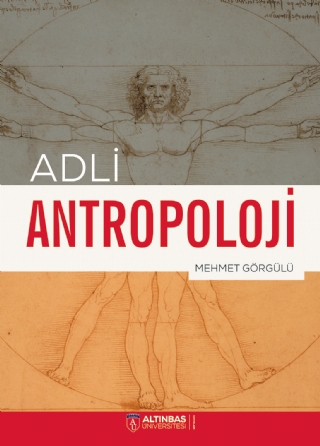
Forensic Anthropology is a science that has become increasingly important and developing in recent years. It provides important contributions to various branches of science, especially forensic Sciences, Law and Archeology. It has an indispensable importance in the identification of biological materials belonging to humans, animals and plants mainly in archaeological areas, and in the identification of corpses and skeletons in forensic sciences. Ancient DNA, which is one of the biological materials obtained in archeology, and genetic studies from corpses and skeletons in forensic and legal sciences have also developed considerably in recent years and have become one of the fields of study of Forensic Anthropology.

Forensic psychologists are experts whose expertise is consulted in the judicial system. Forensic psychology, at the intersection of psychology and law, aims to produce scientific data in the solution of psycho-legal problems, transform the data into general rules, inform the legal system within the framework of the developed theories, and provide support to policy developers in order to design legal processes in a way that protects the life of the individual and society. In this context, forensic psychologists consider themselves responsible for presenting their expert opinion within the framework of cooperation with legal authorities in practice.
The "Forensic Psychology" book, the first of the three-book series; It consists of Forensic Psychology, Crime and Psychology, Criminal Profile, Ethics in Forensic Psychology. The historical journey of forensic psychology as a science, forensic psychology practices in the world and in Turkey, the relationship of forensic psychology with other disciplines, crime and crime types, the relationship between crime and psychopathology, criminal profiling, crime profile of suicide bombers, ethical principles for forensic psychologists and forensic psychology. Different dimensions of forensic psychology have been highlighted by including many topics such as the duties and responsibilities of psychologists. The topics are conveyed interactively and with rich case examples to guide forensic psychologists, psychologists, experts and practitioners interested in the forensic field.
The "Forensic Psychology" book, the first of the three-book series; It consists of Forensic Psychology, Crime and Psychology, Criminal Profile, Ethics in Forensic Psychology. The historical journey of forensic psychology as a science, forensic psychology practices in the world and in Turkey, the relationship of forensic psychology with other disciplines, crime and crime types, the relationship between crime and psychopathology, criminal profiling, crime profile of suicide bombers, ethical principles for forensic psychologists and forensic psychology. Different dimensions of forensic psychology have been highlighted by including many topics such as the duties and responsibilities of psychologists. The topics are conveyed interactively and with rich case examples to guide forensic psychologists, psychologists, experts and practitioners interested in the forensic field.

The science of psychology reveals the reflections of the theories it has developed in the field of practice, especially in the fields of clinical and applied psychology, through observation, interviews and psychological evaluations. It would be correct to say that these application tools are even more important in forensic-psychological processes. In this book; the similar and different aspects of forensic psychology practices with the practices in other fields of psychology are discussed, the dimensions in observation, interview and evaluation in forensic psychology are detailed, the minimum skills that a forensic psychologist should have and the opportunities to develop these skills, the challenging ways of forensic psychological assessment, assessment-specific skills and case studies. explained with examples.
This book is the second of the three series in the field of forensic psychology. In the book "Observation, Interview and Psychological Evaluation in Forensic Psychology", about criminals, victims, convicts and other parties in forensic processes, they are examined separately as "Observation and Interview in Forensic Processes" and "Psychological Evaluation in Forensic Processes". The topics are conveyed interactively and with rich case examples to guide forensic psychologists, psychologists, experts and practitioners interested in the forensic field.
This book is the second of the three series in the field of forensic psychology. In the book "Observation, Interview and Psychological Evaluation in Forensic Psychology", about criminals, victims, convicts and other parties in forensic processes, they are examined separately as "Observation and Interview in Forensic Processes" and "Psychological Evaluation in Forensic Processes". The topics are conveyed interactively and with rich case examples to guide forensic psychologists, psychologists, experts and practitioners interested in the forensic field.

The law, which is the general truth, has to benefit from the light of psychology in the investigation and prosecution of the crime and reintegrating the criminal to the society. Forensic psychology carries out both scientific and applied studies in the context of providing information to the field of law and helping the law in determining the truth and reintegrating the criminal into society. Criminals, victims, witnesses, convicts and other parties in the legal system are in the field of forensic psychology. We cannot help but think about what a wealth of work forensic psychology has in the processes of investigation, prosecution, approval and withdrawal of crime. This richness reminds us that psycho-legal expertise also has its own dynamics.
In the third of these book series, "Psychological Treatment and Rehabilitation in Forensic Psychology", since adults and children who cross paths with the legal system have different characteristics from each other, psychologists, forensic students are given in the sections "Psychological Treatment and Rehabilitation of Adults in Judicial Processes" and "Psychological Treatment and Rehabilitation of Children in Judicial Processes". The topics are conveyed interactively and with rich case examples to guide psychologists, forensic experts and practitioners. In addition to psychological treatment and rehabilitation with adults and children, the book also includes the "Interesting Cases in Forensic Psychology" section to enable us to think about the differences in cases seen in the forensic field.
In the third of these book series, "Psychological Treatment and Rehabilitation in Forensic Psychology", since adults and children who cross paths with the legal system have different characteristics from each other, psychologists, forensic students are given in the sections "Psychological Treatment and Rehabilitation of Adults in Judicial Processes" and "Psychological Treatment and Rehabilitation of Children in Judicial Processes". The topics are conveyed interactively and with rich case examples to guide psychologists, forensic experts and practitioners. In addition to psychological treatment and rehabilitation with adults and children, the book also includes the "Interesting Cases in Forensic Psychology" section to enable us to think about the differences in cases seen in the forensic field.

The Taliban, who was removed from the administration with the international intervention in 2001, took over the administration in Afghanistan after twenty years. In this work titled Taliban in Afghan Political Life, Author; With the background of his senior position in Kabul in 2014-15, he examines the reasons for the success of the Taliban and the failure of NATO and the Afghan Government. The book sheds light on Afghanistan's recent history, geography, ethnic division, sectarian structure, power centers, the interests and approaches of other countries, the fragility of the state, the past and present of the Taliban, the developments after the international intervention in Afghanistan, and the current situation of the country. It also makes predictions about the future of the country.

One of the most important results of the transformation of human conceptions produced in the classical world in the modern period is that people change their expectations and hopes about themselves. This situation both affected the hierarchy of questions and required a new set of questions to be asked in the field of ethics, as in many other fields. In this context, especially in the last half century, the reason for human morality has become questionable and some movements have begun to evaluate morality as a purely conscientious condition.
As long as morality is understood as a phenomenon completely related to the conscience of the individual, the relationship between individuals or the outward aspect of morality should be considered as a problem of politics rather than morality. In this case, a sanction can be mentioned as long as the situations to be considered as immoral fall into the field of law. However, since this result is essentially an extension or inevitable result of a certain conception of man and society, it requires to be considered in terms of different conceptions of man and society. In the book in your hand, you will find the texts of the conferences held in the "Conversations on Moral Sanction" series held within the Islamic Moral Thought Project in 2015 in order to question the relationship between morality and sanction.
As long as morality is understood as a phenomenon completely related to the conscience of the individual, the relationship between individuals or the outward aspect of morality should be considered as a problem of politics rather than morality. In this case, a sanction can be mentioned as long as the situations to be considered as immoral fall into the field of law. However, since this result is essentially an extension or inevitable result of a certain conception of man and society, it requires to be considered in terms of different conceptions of man and society. In the book in your hand, you will find the texts of the conferences held in the "Conversations on Moral Sanction" series held within the Islamic Moral Thought Project in 2015 in order to question the relationship between morality and sanction.

Today, global and regional actors realize their economic, political, cultural and security initiatives and orientations to a large extent through maritime transport lines. In this respect, the seas and sea routes have become an important element of geopolitical competition.
The Mediterranean is a sea of increasing geopolitical and geostrategic importance. It is one of the most important crossroads of international trade. The Mediterranean, which connects the continents of Asia, Europe and Africa, is the focal point of the maritime transport lines stretching to the Indian Ocean and Far East countries via the Suez Canal on the one hand, and to the Atlantic and North and South American countries via the Strait of Gibraltar on the other hand.
The Mediterranean's position in terms of energy is increasing the power race and geoeconomic competition on the world scale over the Mediterranean.
The Mediterranean gives a new dimension and a new orientation to Euro-Atlantic security, and due to its geopolitical position, it directly affects the security dynamics of European, Middle Eastern, North African and Far Eastern countries.
In our country, the necessity of preparing a multidimensional and rich research work on the Mediterranean and presenting it to the service of science has emerged.
The work named Mediterranean Geopolitics has been prepared with the idea of clarifying current issues related to the Mediterranean, determining new orientations and approaches for the future, and adding depth and richness to the field of science.
The Mediterranean is a sea of increasing geopolitical and geostrategic importance. It is one of the most important crossroads of international trade. The Mediterranean, which connects the continents of Asia, Europe and Africa, is the focal point of the maritime transport lines stretching to the Indian Ocean and Far East countries via the Suez Canal on the one hand, and to the Atlantic and North and South American countries via the Strait of Gibraltar on the other hand.
The Mediterranean's position in terms of energy is increasing the power race and geoeconomic competition on the world scale over the Mediterranean.
The Mediterranean gives a new dimension and a new orientation to Euro-Atlantic security, and due to its geopolitical position, it directly affects the security dynamics of European, Middle Eastern, North African and Far Eastern countries.
In our country, the necessity of preparing a multidimensional and rich research work on the Mediterranean and presenting it to the service of science has emerged.
The work named Mediterranean Geopolitics has been prepared with the idea of clarifying current issues related to the Mediterranean, determining new orientations and approaches for the future, and adding depth and richness to the field of science.

The Middle East and North Africa region, which has attracted the attention of the whole world throughout history, has started to take place as one of the most discussed agenda items in the international arena with the start of the process called "Arab Spring". The events in North Africa and the Middle East, known as the "Arab Spring", started in Tunisia and subsequently spread to Egypt, Algeria, Morocco, Libya, Yemen, Bahrain, Saudi Arabia, Jordan, Oman, Syria and Kuwait. Events have evolved in a different direction in each country as a result of the peculiarities of countries such as social culture, political background, experience and institutional structure, and the process has been experienced differently in each country.
In Tunisia, as a result of events where less violence and death were experienced compared to other countries, President Ben Ali had to leave the administration, a temporary government was established, the Constituent Assembly elections were held, and these elections went down in history as the first free and fair elections held in the countries involved in this process. The Constitutional Commission, which was established under the leadership of the Constituent Assembly, completed the Constitution that appeals to all segments of the country and was prepared by taking lessons from past experiences. Subsequently, Tunisia chose the new Prime Minister and President according to this constitution, setting an example for the countries in the region and showing its difference from other countries.
The reforms made as a result of mutual relations with the Ottomans and France in the historical process, and the features such as an educated and strong middle class, unique social and political culture, experience and institutional structure have had a great impact on Tunisia's gaining all this difference and success.
In Tunisia, as a result of events where less violence and death were experienced compared to other countries, President Ben Ali had to leave the administration, a temporary government was established, the Constituent Assembly elections were held, and these elections went down in history as the first free and fair elections held in the countries involved in this process. The Constitutional Commission, which was established under the leadership of the Constituent Assembly, completed the Constitution that appeals to all segments of the country and was prepared by taking lessons from past experiences. Subsequently, Tunisia chose the new Prime Minister and President according to this constitution, setting an example for the countries in the region and showing its difference from other countries.
The reforms made as a result of mutual relations with the Ottomans and France in the historical process, and the features such as an educated and strong middle class, unique social and political culture, experience and institutional structure have had a great impact on Tunisia's gaining all this difference and success.
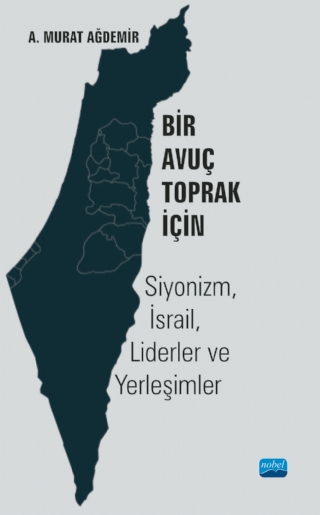
It is important to realize that the thoughts of individuals who direct the policies of states have important consequences. While explaining these relations, it is necessary to try to grasp the role played by history, perceptions and value judgments, and to approach the explanations in which impersonal forces such as structure and state dominate from a human perspective.
The Palestinian Question has been handled from very different perspectives by different academics, writers and commentators. These different perspectives can lead people to new questions and research on the subject under discussion. In this book, it is aimed to present a different point of view to the readers by considering the Palestinian Question, in which the land is divided, in terms of the Jewish leaders' perspective, value judgments, beliefs and attitudes.
The Palestinian Question has been handled from very different perspectives by different academics, writers and commentators. These different perspectives can lead people to new questions and research on the subject under discussion. In this book, it is aimed to present a different point of view to the readers by considering the Palestinian Question, in which the land is divided, in terms of the Jewish leaders' perspective, value judgments, beliefs and attitudes.
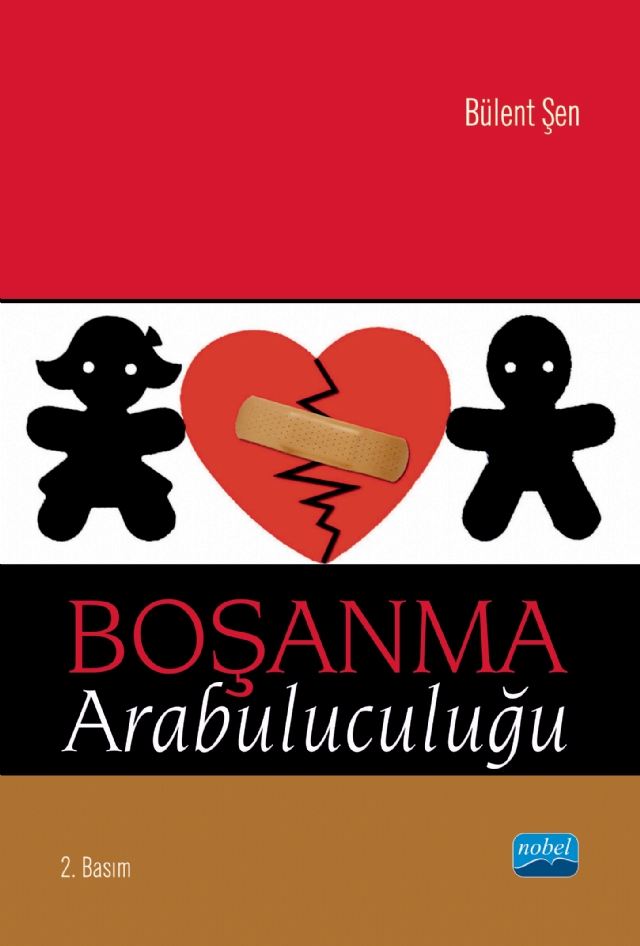
Couples who love each other, dream of growing old together, and after having a child, cannot solve their problems after many unwanted experiences, and perhaps decide to divorce after receiving family counseling; While experiencing the negative processes of divorce, they do not harm each other and their children more in cases where the conditions are made more difficult in the court environment, divorce can be more economical, in a shorter time, with fairer conditions for both parties, both parties and their families can remain friends after the divorce, children can always be It is thought that completing the divorce process by making joint decisions under the supervision of an impartial third person, where they can see both parents regularly and receive support, will contribute positively to both couples and children and society.
In the book, both domestic and international literature and practices have been tried to be presented to the readers with an impartial eye, and they will work on divorce mediation. to academics; to students and practitioners of law, social work, psychology, psychological counseling, sociology, child development, preschool education, family and consumer sciences; to family counselors; to family court judges and experts; To the members of the 2nd Civil Chamber of the Supreme Court; to experts who will conduct legal studies on this subject; it has been tried to give basic information to the managers of the relevant institutions and organizations, to the readers who are curious about the issue of divorce mediation and to the couples who want to get divorced by agreement.
At the end of the book; Family Counselors who have received 450 hours of training in the guidelines issued by the Ministry of Family and Social Policies and have a Family Counseling certificate, and the desire of Lawyers who have received mediation training within the scope of the Mediation Law, to work together and to carry out interdisciplinary and holistic studies on Divorce Mediation, which can set an example for other countries, has been expressed.
In the book, both domestic and international literature and practices have been tried to be presented to the readers with an impartial eye, and they will work on divorce mediation. to academics; to students and practitioners of law, social work, psychology, psychological counseling, sociology, child development, preschool education, family and consumer sciences; to family counselors; to family court judges and experts; To the members of the 2nd Civil Chamber of the Supreme Court; to experts who will conduct legal studies on this subject; it has been tried to give basic information to the managers of the relevant institutions and organizations, to the readers who are curious about the issue of divorce mediation and to the couples who want to get divorced by agreement.
At the end of the book; Family Counselors who have received 450 hours of training in the guidelines issued by the Ministry of Family and Social Policies and have a Family Counseling certificate, and the desire of Lawyers who have received mediation training within the scope of the Mediation Law, to work together and to carry out interdisciplinary and holistic studies on Divorce Mediation, which can set an example for other countries, has been expressed.

This book is a labor of love inspired by the continuous interaction and interaction between young Greek and Turkish participants in numerous forums that the two editors have nurtured for close to a decade. In an international order dominated by hostility, distrust and negative stereotypes, dialogues across borders are a positive response. The conflict between Greece and Turkey is considered one of the most complex conflicts in Europe, and possibly beyond. For decades, the bilateral strife has repeatedly led insecurity as well as periodic violence and war. Also, in this part of the world, the past weighs heavily on the present. What happened long ago determines what happens today and may stand in the way of a peaceful future, or even in imagining one. Conflicts bedevil the bilateral relationship on multiple fronts. As in other cross-border rivalries, we are witnesses to dynamic developments as new contentious issues have emerged to complicate the agenda.
With an eye on what the two sides can do together; this book presents original research co-written by at least one Greek and one Turkish scholar with the objective to provide policy recommendations that could help in bridging the gaps to enhance Greek-Turkish dialogue and cooperation.
With an eye on what the two sides can do together; this book presents original research co-written by at least one Greek and one Turkish scholar with the objective to provide policy recommendations that could help in bridging the gaps to enhance Greek-Turkish dialogue and cooperation.
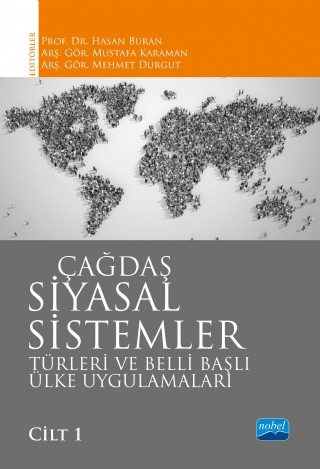
Since the formal framework of the political systems is determined by the constitution and laws of the relevant country, it is possible to have a certain idea about the general characteristics and functioning of the political regime. However, in addition to the constitution and some basic laws of a country, looking at the historical, geographical, social, cultural and economic characteristics of that country, its political parties, party system, election system, pressure and interest groups, is a more accurate and more consistent analysis of the functioning of the political system in that country. will further increase our ability to do so.
This work; It is composed of two volumes, to some extent interconnected, to some extent independent. In this first volume; the state, state theories, elements of the state, democracy, legislative, executive, judiciary, election, electoral systems, pressure and interest groups and party systems are discussed theoretically. Then, country practices that will be suitable for political regimes and their sub-derivatives are given. The Swiss practice is given as a partial example of the Parliamentary Government System, one of the systems based on the union of powers. Among the political systems based on the separation of powers, the country practices of England, Sweden and Saudi Arabia as an example of the Parliamentary System with a Constitutional Monarchy, and the country practices of Germany, Italy and the Republic of South Africa as an example of the Republican Parliamentary System are included.
In the second volume, 10 different presidential systems related to five sub-derivatives of semi-presidential systems, 4 different presidential systems related to sub-derivatives of presidential systems, and the Presidential Government System in Turkey will be covered.
Hope it will be helpful to the reader...
This work; It is composed of two volumes, to some extent interconnected, to some extent independent. In this first volume; the state, state theories, elements of the state, democracy, legislative, executive, judiciary, election, electoral systems, pressure and interest groups and party systems are discussed theoretically. Then, country practices that will be suitable for political regimes and their sub-derivatives are given. The Swiss practice is given as a partial example of the Parliamentary Government System, one of the systems based on the union of powers. Among the political systems based on the separation of powers, the country practices of England, Sweden and Saudi Arabia as an example of the Parliamentary System with a Constitutional Monarchy, and the country practices of Germany, Italy and the Republic of South Africa as an example of the Republican Parliamentary System are included.
In the second volume, 10 different presidential systems related to five sub-derivatives of semi-presidential systems, 4 different presidential systems related to sub-derivatives of presidential systems, and the Presidential Government System in Turkey will be covered.
Hope it will be helpful to the reader...
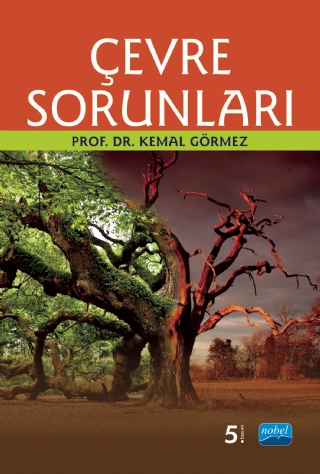
Ecological problems, which a sage defined as "nature's revenge on humankind", are among the main problems faced by human beings today.
Environmental problems, which have become one of the problems threatening humanity since the second half of the 20th century, have generally become felt as a result of the Industrial Revolution, although its roots date back to ancient times. Since then, it has grown to great sizes. Despite the measures developed in recent years, many people are not hopeful for the future yet. Discussions and researches on this problem, which was perceived only as pollution in the past and which covers all areas of social life, are increasingly intensifying.
This book was written mainly to meet students' resource needs on ecology and environmental problems.
Environmental problems, which have become one of the problems threatening humanity since the second half of the 20th century, have generally become felt as a result of the Industrial Revolution, although its roots date back to ancient times. Since then, it has grown to great sizes. Despite the measures developed in recent years, many people are not hopeful for the future yet. Discussions and researches on this problem, which was perceived only as pollution in the past and which covers all areas of social life, are increasingly intensifying.
This book was written mainly to meet students' resource needs on ecology and environmental problems.
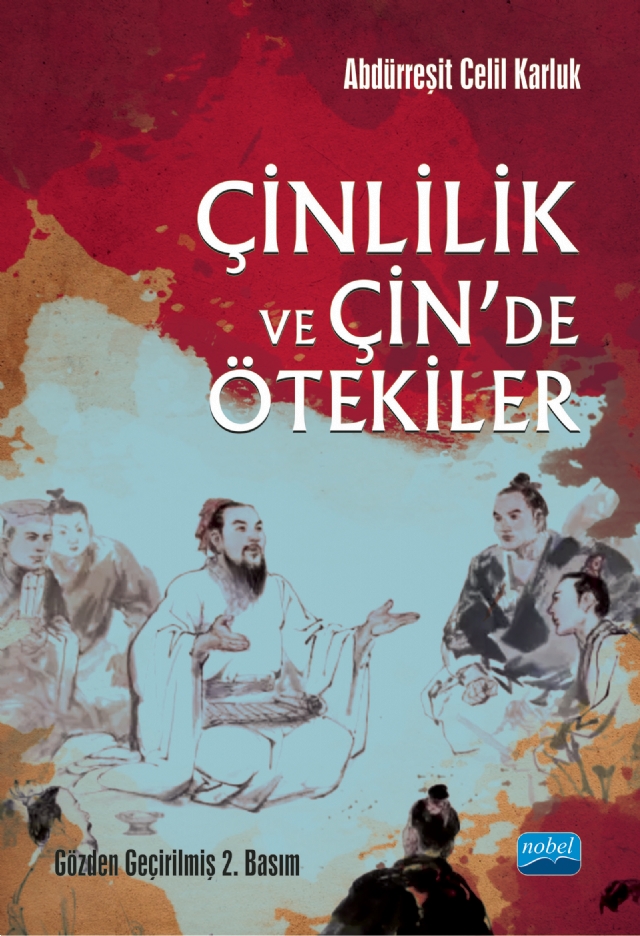
According to Fei Xiaotong, Chineseness is actually like a snowball. It is the process of social and cultural assimilation of non-Chinese foreigners within its political borders, which grows by clinging to the foreigners around it, with Huaxia at its core. The Chinese, who keep the Chineseness alive, have always kept themselves separate and superior to the others.
China, sociologically, can be generally divided into cultural China and political China. Cultural China is a homogeneous reality in which all the elements that make up Chineseness are completely dominated, and there is essentially no difference. Political China, on the other hand, is the regions inhabited by non-Chinese peoples who are later included in China's hegemony, who are dependent or indirectly governed by China. In Chinese history, cultural China always wants to swallow political China, and for this, it develops a strategy and implements it persistently. When political China becomes cultural China, a political China is reconstructed. Political China was often built by foreigners who dominated China.
This study deals with Chineseness and the strategies applied in the process of governing with the others in the order in which Chinese is dominant, and the social and cultural integration processes of non-Chinese peoples in Chineseness from a sociological perspective. Related topics covered; It will help to understand the inhumane practices of the CCP power in East Turkestan, Tibet and Hong Kong, as well as the Chineseization of religions, the prohibition of foreign resources in educational institutions, and Chinese-specific situations such as debt diplomacy and credit trapping.
China, sociologically, can be generally divided into cultural China and political China. Cultural China is a homogeneous reality in which all the elements that make up Chineseness are completely dominated, and there is essentially no difference. Political China, on the other hand, is the regions inhabited by non-Chinese peoples who are later included in China's hegemony, who are dependent or indirectly governed by China. In Chinese history, cultural China always wants to swallow political China, and for this, it develops a strategy and implements it persistently. When political China becomes cultural China, a political China is reconstructed. Political China was often built by foreigners who dominated China.
This study deals with Chineseness and the strategies applied in the process of governing with the others in the order in which Chinese is dominant, and the social and cultural integration processes of non-Chinese peoples in Chineseness from a sociological perspective. Related topics covered; It will help to understand the inhumane practices of the CCP power in East Turkestan, Tibet and Hong Kong, as well as the Chineseization of religions, the prohibition of foreign resources in educational institutions, and Chinese-specific situations such as debt diplomacy and credit trapping.

Turkish-American relations have a history approaching a quarter of a millennium. The history of bilateral relations covers a period from a collapsed great power and a rising great power, in other words “the Phoenix to the descent”, and the American eagle taking off to take the place of the Roman Empire, to the present day. For this reason, the most important feature of relations is the phenomenon of inequality in power.
On the one hand, this book proposes a statistical analysis-supported method for strategies and policies to be applied in relationships in different power categories, and presents a model to IR professionals and students. Thus, it is to shed light on the strategies and policies that unequal powers can implement against each other.
On the other hand, the book hopes to be useful to all readers by reminding the brief history of the events, facts, crises, strategies and policies implemented in Turkish-American relations from the first establishment of diplomatic relations to the present, and by giving clues about the analysis of bilateral relations, which gradually turned into a chess game.
Prof. dr. In the words of Şükrü Sina Gürel, the book aims not only to evaluate Turkish-American relations on the basis of "power and interest", but also to present a theoretical analysis of the relationship model between a "global dominant power" and a "middle power country".
On the one hand, this book proposes a statistical analysis-supported method for strategies and policies to be applied in relationships in different power categories, and presents a model to IR professionals and students. Thus, it is to shed light on the strategies and policies that unequal powers can implement against each other.
On the other hand, the book hopes to be useful to all readers by reminding the brief history of the events, facts, crises, strategies and policies implemented in Turkish-American relations from the first establishment of diplomatic relations to the present, and by giving clues about the analysis of bilateral relations, which gradually turned into a chess game.
Prof. dr. In the words of Şükrü Sina Gürel, the book aims not only to evaluate Turkish-American relations on the basis of "power and interest", but also to present a theoretical analysis of the relationship model between a "global dominant power" and a "middle power country".
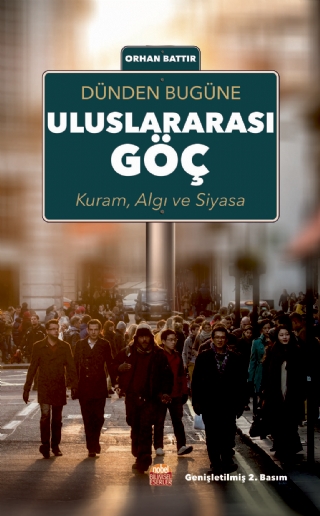
Migration movements with increasing speed and visibility in the modern period; While it was a socio-demographic phenomenon at the action level, it was first included in the political field and then securitized and became a high policy issue. In the current century, migration has already become one of the top priorities of the international community's agenda, which directly affects the functioning of the international system and shapes the interaction between system actors. It is seen that the academic interest in the issue of migration has increased gradually due to the fact that it has come to the fore with its problematic aspects in recent years.
This work deals with the fact that people leave their places of residence and settle in other places, albeit for very different reasons, as a state of nature in the historical process. Therefore, in the work; There are evaluations that seeing the phenomenon of immigration as a "crime" that must be prevented and accordingly looking at immigrants as "criminal" consists of a fundamental illusion. Of course, while doing this, care is taken not to make the mistake of ignoring or ignoring problems based on immigration.
This work deals with the fact that people leave their places of residence and settle in other places, albeit for very different reasons, as a state of nature in the historical process. Therefore, in the work; There are evaluations that seeing the phenomenon of immigration as a "crime" that must be prevented and accordingly looking at immigrants as "criminal" consists of a fundamental illusion. Of course, while doing this, care is taken not to make the mistake of ignoring or ignoring problems based on immigration.

The Aegean Sea forms an important waterway between the Black Sea and the Mediterranean, together with the Bosporus and Dardanelles Straits. For all countries using this waterway, the Aegean Sea maintains its geopolitical and geostrategic importance. Since it is a semi-enclosed sea, it is important to produce and monitor stability-oriented policies in the Aegean Sea. In this way, the Aegean Sea's setting an example for peace and stability and its continuation will contribute greatly to peace in the region and the world. In this period where maritime security and stability gain more importance than ever before establishing and maintaining mutual trust between riparian countries in the Aegean Sea is possible if the parties comply with the provisions of the International Agreement and the Convention.
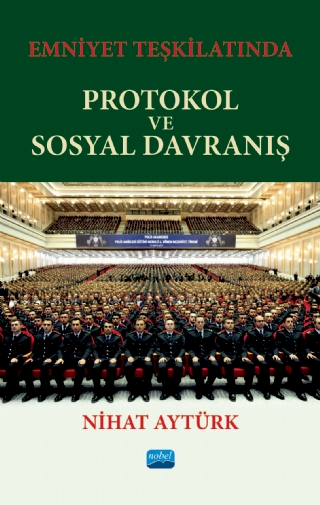
The public and social life of each director, supervisor and officer in the police force is passed within the rules of protocol and social behavior (respect and courtesy). Knowing and complying with the protocol and rules of social behavior is imperative in terms of corporate and national representation and reputation.
The aim of this book is to students studying at Police Academy, Police Chiefs Training Center, Police Vocational Training Centers, Police Vocational Schools and Institutes; It is to contribute to the managers and officers working at all levels in the Police Service, to those working in VIP, Mission Protection and International organizations, to those who are preparing for exams in this field, in terms of protocol and code of conduct, to increase the prestige of the institution and the profession at national and international level.
The aim of this book is to students studying at Police Academy, Police Chiefs Training Center, Police Vocational Training Centers, Police Vocational Schools and Institutes; It is to contribute to the managers and officers working at all levels in the Police Service, to those working in VIP, Mission Protection and International organizations, to those who are preparing for exams in this field, in terms of protocol and code of conduct, to increase the prestige of the institution and the profession at national and international level.

La Première Guerre mondiale était une compétition pour diviser le pillage des terres ottomanes entre les grandes puissances de l'époque. Les attaques impérialistes sont venues des deux côtés. La défense de l’État (ottoman) sur le front oriental, n’a rien de différent de sa défense sur la péninsule de Gallipoli à l’ouest, en termes de sécurité de tous les peuples du pays.
Ensuite, le gouvernement n'a pas eu d'autre choix que de mettre en pratique la pratique de la déportation pour éviter la rébellion, à savoir: la trahison arménienne, qui est aujourd'hui généralement symbolisé par la date du 24 avril 1915, qui devient également une veille du "débarquement britannique à Gallipoli".
Le décret de réinstallation émis par le gouvernement ottoman visait à empêcher les résidents locaux de soutenir, de renforcer et d'inciter les mouvements arméniens agressifs, qui se battaient volontiers pour l'armée adversaire (russe) contre leur propre pays, étant eux-mêmes et aux citoyens de l'Empire ottoman. En plus de cela, sous la forme de gangs armés organisés, ils assassinaient des innocents turcs et / ou musulmans de la région.
Cette décision de réinstallation temporaire a également résolu d'autres problèmes au sein des lignes de communication logistique de l'armée et des autres lignes d'approvisionnement, qui ont été empêchés par ces gangs.
Des gangs arméniens poignardaient l'armée ottomane dans le dos, et des mutinés arméniens causaient encore d'autres maux tels que torturer et massacrer honteusement des femmes, des personnes âgées et des enfants dans les maisons turco-musulmanes laissées par les jeunes de la maison, ceux qui étaient alors occupés à mener des batailles féroces sur les lignes de front d'une guerre féroce, ce que ces gangs faisaient était exactement un "nettoyage ethnique", que dans ces circonstances, la décision de l'État était une précaution obligatoire de la situation de guerre stratégique.
Ensuite, le gouvernement n'a pas eu d'autre choix que de mettre en pratique la pratique de la déportation pour éviter la rébellion, à savoir: la trahison arménienne, qui est aujourd'hui généralement symbolisé par la date du 24 avril 1915, qui devient également une veille du "débarquement britannique à Gallipoli".
Le décret de réinstallation émis par le gouvernement ottoman visait à empêcher les résidents locaux de soutenir, de renforcer et d'inciter les mouvements arméniens agressifs, qui se battaient volontiers pour l'armée adversaire (russe) contre leur propre pays, étant eux-mêmes et aux citoyens de l'Empire ottoman. En plus de cela, sous la forme de gangs armés organisés, ils assassinaient des innocents turcs et / ou musulmans de la région.
Cette décision de réinstallation temporaire a également résolu d'autres problèmes au sein des lignes de communication logistique de l'armée et des autres lignes d'approvisionnement, qui ont été empêchés par ces gangs.
Des gangs arméniens poignardaient l'armée ottomane dans le dos, et des mutinés arméniens causaient encore d'autres maux tels que torturer et massacrer honteusement des femmes, des personnes âgées et des enfants dans les maisons turco-musulmanes laissées par les jeunes de la maison, ceux qui étaient alors occupés à mener des batailles féroces sur les lignes de front d'une guerre féroce, ce que ces gangs faisaient était exactement un "nettoyage ethnique", que dans ces circonstances, la décision de l'État était une précaution obligatoire de la situation de guerre stratégique.

La Primera Guerra Mundial fue una competición de repartimiento el saqueo de tierras otomanas entre las grandes potencias de la época. Los asaltos imperialistas venían por ambos lados. La defensa del Estado (Otomano) en el 'frente oriental' no era nada diferente de su defensa en la Península de Gallipoli en el occidente, en términos de la seguridad de todos los pueblos del país.
Entonces el gobierno no tenía más remedio que poner en vigor la práctica de deportación para evitar la rebelión, i.e: la traición, armenia, la que hoy suele ser simbolizada por la fecha del 24 de abril de 1915, el que también pasa a ser un día antes del 'desembarco británico en Gallipoli'.
El decreto de reubicación emitido por el Gobierno Otomano tenía la intención de impedir a los residentes locales apoyar, reforzar e instigar a los agresivos movimientos armenios, quienes voluntariamente estaban luchando por el ejército adversario (ruso) en contra a su propio país, siendo ellos mismos ya los ciudadanos del Imperio Otomano. Además de esto, en forma de unas bandas armadas que organizaban, estaban asesinando a las inocentes gentes turcas y/o musulmanas de la zona.
Esta decisión de recolocación temporaria resolvió también unos otros problemas dentro de las líneas de comunicación logísticas del ejército y las otras líneas de suministro, las que se impedían por éstas bandas.
Las pandillas armenias estaban apuñalando al ejército otomano por la espalda y los mutinos armenios causaban aun otros males como que torturaban y masacraban vergonzosamente a las mujeres, a los ancianos y a los niños en las casas turcas/musulmanes dejadas atras por los jóvenes de la casa, quienes entonces estaban ocupados luchando feroces batallas en las líneas del frente de una feroz guerra, lo que hacian aquellas bandas era exactamente una “limpieza étnica”, que en estas circunstancias, la decisión del estado era una precaución obligatoria del la situación estratégica bélica.
Entonces el gobierno no tenía más remedio que poner en vigor la práctica de deportación para evitar la rebelión, i.e: la traición, armenia, la que hoy suele ser simbolizada por la fecha del 24 de abril de 1915, el que también pasa a ser un día antes del 'desembarco británico en Gallipoli'.
El decreto de reubicación emitido por el Gobierno Otomano tenía la intención de impedir a los residentes locales apoyar, reforzar e instigar a los agresivos movimientos armenios, quienes voluntariamente estaban luchando por el ejército adversario (ruso) en contra a su propio país, siendo ellos mismos ya los ciudadanos del Imperio Otomano. Además de esto, en forma de unas bandas armadas que organizaban, estaban asesinando a las inocentes gentes turcas y/o musulmanas de la zona.
Esta decisión de recolocación temporaria resolvió también unos otros problemas dentro de las líneas de comunicación logísticas del ejército y las otras líneas de suministro, las que se impedían por éstas bandas.
Las pandillas armenias estaban apuñalando al ejército otomano por la espalda y los mutinos armenios causaban aun otros males como que torturaban y masacraban vergonzosamente a las mujeres, a los ancianos y a los niños en las casas turcas/musulmanes dejadas atras por los jóvenes de la casa, quienes entonces estaban ocupados luchando feroces batallas en las líneas del frente de una feroz guerra, lo que hacian aquellas bandas era exactamente una “limpieza étnica”, que en estas circunstancias, la decisión del estado era una precaución obligatoria del la situación estratégica bélica.
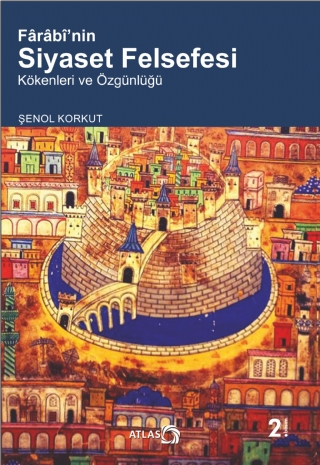
This book examines the political philosophy of the Second Muallim Fârâbî in terms of its origins and originality.
Fârâbî, who built the political science and philosophy in Islamic thought as a science, also pursued a series of alternative political theories to the political thought of the Athenian-oriented Greek philosophy. Al-Farabi, who built a unique political philosophy between the political elements brought by the revelation of Islam and the ancient Greek political philosophy, on the one hand brought new problem areas to political philosophy, on the other hand, he brought a new horizon to Islamic thought with the doctrine of virtuous and virtuous cities. It is possible to see the virtuous and immoral perspectives developed by the philosopher on the ground of philosophy, nation and medina, in all the problem groups he examines about political philosophy. In this book, on the one hand, virtuous philosophy, virtuous religion and the idealized philosophical adventure of the virtuous city are examined, on the other hand, the story of corrupt philosophy, corrupt religions and unvirtuous cities in the philosophical filter of the Second Teacher is discussed.
Fârâbî, who built the political science and philosophy in Islamic thought as a science, also pursued a series of alternative political theories to the political thought of the Athenian-oriented Greek philosophy. Al-Farabi, who built a unique political philosophy between the political elements brought by the revelation of Islam and the ancient Greek political philosophy, on the one hand brought new problem areas to political philosophy, on the other hand, he brought a new horizon to Islamic thought with the doctrine of virtuous and virtuous cities. It is possible to see the virtuous and immoral perspectives developed by the philosopher on the ground of philosophy, nation and medina, in all the problem groups he examines about political philosophy. In this book, on the one hand, virtuous philosophy, virtuous religion and the idealized philosophical adventure of the virtuous city are examined, on the other hand, the story of corrupt philosophy, corrupt religions and unvirtuous cities in the philosophical filter of the Second Teacher is discussed.

Dictionary of Philosophy Doctrines and Terms, mainly to prevent conceptual anarchy; in order to fill a large gap in the philosophy dictionary in the market, to arouse interest in philosophical issues, to warn especially young people against the bad and destructive effects and suggestions of negative currents, to show them the roots of these currents, to facilitate and give clues to those who are in the field of philosophy in the research they want to do. has been written. This dictionary; In addition to being a helpful book especially for philosophy teachers, students, and those who are closely or distantly interested in philosophy, it introduces readers from all fields to certain philosophical doctrines.

Introduction to Philosophy is written for those seeking an introduction to philosophy as a discipline and intellectual activity. The work aims to make this introduction by introducing philosophy itself, its basic concepts, trends and subjects, and ways of thinking and reasoning specific to philosophy. In the work, which consists of eight chapters, after a first chapter that aims to establish an acquaintance with philosophy, issues related to epistemology, philosophy of science, philosophy of being, ethics, political philosophy, philosophy of religion and philosophy of art are included.
Introduction to Philosophy appeals to all those who want to meet philosophy and want to include philosophy, which we can define as "thinking on big questions in an argumentative and questioning way", into their lives in some way. Written for future teacher candidates. The most important feature of the work is that it deals with the subjects of philosophy with a constructivist approach, that is, the book, Introduction to Philosophy, has been created by using diagrams and visual materials in a way that will enable the student to think about philosophical questions and problems and make the necessary inquiries, instead of conveying ready-made information about the subjects and problems of philosophy.
Introduction to Philosophy appeals to all those who want to meet philosophy and want to include philosophy, which we can define as "thinking on big questions in an argumentative and questioning way", into their lives in some way. Written for future teacher candidates. The most important feature of the work is that it deals with the subjects of philosophy with a constructivist approach, that is, the book, Introduction to Philosophy, has been created by using diagrams and visual materials in a way that will enable the student to think about philosophical questions and problems and make the necessary inquiries, instead of conveying ready-made information about the subjects and problems of philosophy.

This book discusses the concept of “migration” from an interdisciplinary perspective. While most of the research on migration in the field focuses on the subject with a single discipline, this book in your hand sheds light on the phenomenon of migration with different dimensions of many disciplines. In addition to migration studies, the book will also be a valuable resource for students and academics who do research in different disciplines.
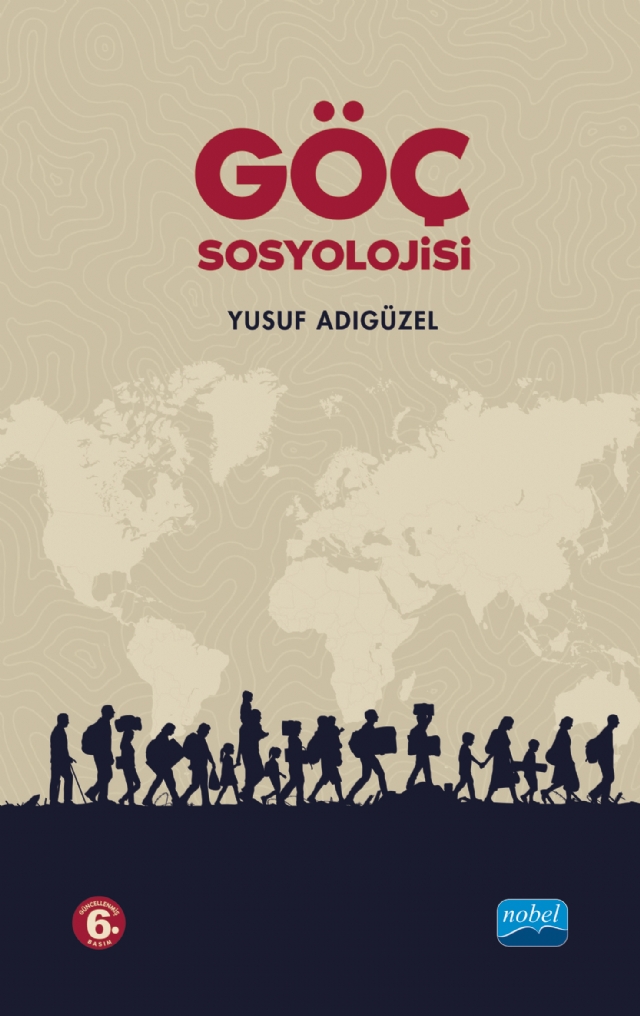
This book, which is an introduction to basic migration issues, made its 5th edition in a short time and became one of the reference works in the field. The Sociology of Migration book aims to focus on the sociological dimensions of migration and its national and international social effects. In the book, firstly, the concepts and theories related to migration are explained, and migration movements are handled with a local to global theme. Internal migration processes in Turkey are evaluated together with the dimensions of urbanization, urbanization and citizenship. Migrations from Turkey to abroad and regular and irregular migrations from abroad to Turkey are examined. Global migrations, migration policies, models of living together, diasporas, return migrations, immigrant solidarity networks, public institutions and NGOs working in the field of migration are also among the topics covered in this book.
Sociology of Migration will be an important reference source for students and academics in all social sciences, especially sociology, law, political science and international relations disciplines of universities.
Sociology of Migration will be an important reference source for students and academics in all social sciences, especially sociology, law, political science and international relations disciplines of universities.
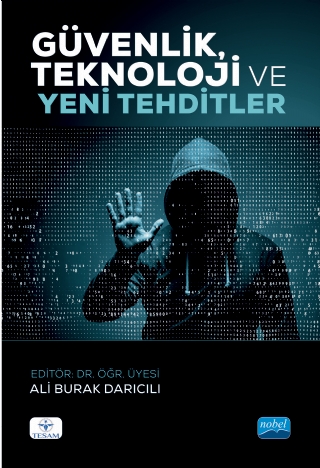
According to the research; Today, approximately 4.5 billion people use the internet, 5.2 billion people use mobile phones and an average of 6 hours and 43 minutes a day users spend time on the Internet. This shows that technology has permeated every aspect of life.
As a result of the rapid increase in the use of technology, individuals, business world and government institutions store or transfer their critical intelligence, economic and personal information through these technology tools. It is becoming more and more impossible for people to participate or contribute to business life without smartphone technologies. Social media applications have now become a very important information strategy product within the scope of cheap, flexible, effortless and crypto features. However, with the development of technology, security concerns have emerged in information systems depending on globalization. From the theft of personal data to the use of the Internet and social media as a propaganda tool by terrorist organizations, negative aspects that affect individuals and states have emerged.
In this book, different topics such as cyber security, social media, nuclear and military technology, terrorism and technology relationship, artificial intelligence technologies, urban security and technology, unmanned aerial vehicles (UAV) technologies, border security and technology are discussed and basically the relationship between technology and security. In this context, how technological progress will change security paradigms in the future and how it will affect individuals and states has been revealed.
As a result of the rapid increase in the use of technology, individuals, business world and government institutions store or transfer their critical intelligence, economic and personal information through these technology tools. It is becoming more and more impossible for people to participate or contribute to business life without smartphone technologies. Social media applications have now become a very important information strategy product within the scope of cheap, flexible, effortless and crypto features. However, with the development of technology, security concerns have emerged in information systems depending on globalization. From the theft of personal data to the use of the Internet and social media as a propaganda tool by terrorist organizations, negative aspects that affect individuals and states have emerged.
In this book, different topics such as cyber security, social media, nuclear and military technology, terrorism and technology relationship, artificial intelligence technologies, urban security and technology, unmanned aerial vehicles (UAV) technologies, border security and technology are discussed and basically the relationship between technology and security. In this context, how technological progress will change security paradigms in the future and how it will affect individuals and states has been revealed.

Despite its standing in world politics, there is still a paucity of academic publications concerning Turkish foreign policy. In addition, most of the existing publications prefer only to narrate it historically.
This book takes a step back and critically analyses the factors and actors which affect Turkish foreign policy within a theoretical and conceptual framework as well as a historical setting covering the Kemalist period in particular. In addition, this book presents its subject matter from a broader and longer perspective, taking together both material and ideational phenomena, all the while focussing on the ideas, ideologies and norms which are ignored by many analysts of Turkish politics.
Turkish foreign policy of the past and even up to the present appears to be a product of certain “foundations” that were laid down by the Kemalist leadership and cadres after the establishment of the Turkish Republic. However, this book reviews these foundations comparatively with the Ottoman modernisation period including as well certain detailed references to the classical age of the Empire in order to demonstrate that there are not so much epistemological ruptures between past and present in a broader sense.
This book takes a step back and critically analyses the factors and actors which affect Turkish foreign policy within a theoretical and conceptual framework as well as a historical setting covering the Kemalist period in particular. In addition, this book presents its subject matter from a broader and longer perspective, taking together both material and ideational phenomena, all the while focussing on the ideas, ideologies and norms which are ignored by many analysts of Turkish politics.
Turkish foreign policy of the past and even up to the present appears to be a product of certain “foundations” that were laid down by the Kemalist leadership and cadres after the establishment of the Turkish Republic. However, this book reviews these foundations comparatively with the Ottoman modernisation period including as well certain detailed references to the classical age of the Empire in order to demonstrate that there are not so much epistemological ruptures between past and present in a broader sense.

In the 21st century, education became one of the most crucial elements in people's lives. Day-by-day, finding a well-paid job is getting tough process for young people. Notably, higher education plays a highly-critical role in the people's careers.
Most of developed and developing countries have started international student projects which aim to increase number of international students. Japan also is one of those countries with various projects. Japan provides the MEXT (Monbukagakusho) Scholarship by Japan's central government.
• Why countries invest on international students?
• Would it be a soft power tool for a host country?
• What do international students think about it?
This book focuses on the perspective of the international students:
• What are the motivations for them for choosing Japan?
• What are their career goals?
• How those goals are being evaluated?
• How do they perceive the Japanese government's MEXT scholarship project?
Most of developed and developing countries have started international student projects which aim to increase number of international students. Japan also is one of those countries with various projects. Japan provides the MEXT (Monbukagakusho) Scholarship by Japan's central government.
• Why countries invest on international students?
• Would it be a soft power tool for a host country?
• What do international students think about it?
This book focuses on the perspective of the international students:
• What are the motivations for them for choosing Japan?
• What are their career goals?
• How those goals are being evaluated?
• How do they perceive the Japanese government's MEXT scholarship project?

The Syrian crisis, which broke out in March 2011 and almost caused a global earthquake, has been one of the most pressing issues in Turkish foreign policy for the past 10 years. The Syria policy that Turkey followed during the Arab Spring period caused great debates both at home and abroad from the first day and increased academic interest in Turkey-Syria relations. However, despite this increasing interest recently, it is observed that studies examining the relations between the two countries mostly focus on current developments and miss the historical dynamics of Turkey's Syria policy. This book sheds light on the period of 1960-1980, which has not been discussed in detail in the literature on Turkey-Syria relations until now. In the book, Turkey's policy towards its neighbor Syria in the 1960s and 1970s, when it sought new foreign policy, is analyzed based on domestic and foreign archive documents. The book reveals that Turkey-Syria relations, which were overshadowed by the Cold War rivalry in the 1950s and PKK terrorism in the post-1980 period, settled on a clear ground of softening and reconciliation in the period from the 27 May 1960 coup to the 12 September 1980 coup. We hope that this book will be instrumental in carrying out the debates around Turkey-Syria relations on a healthier ground.

No war can be understood independently of the multi-layered accumulation of historical, political, ethnic, religious, economic, cultural and commercial interests that prepared it.
In this context, this work named World War II; While pursuing to bring to light the intertwined and complex causes of the Second World War that are beyond the visible, it also examines the background of the effect of economic and political crises on the strengthening of totalitarian regimes, together with its intricate causes.
In addition, while reconsidering the causes and consequences of the Second World War, as the bloodiest conflict of the twentieth century, eighty years later, it also sheds light on its complex connection with the problems eighty years later, enabling us to understand the hot and cold war potential of power relations in today's world.
The thousands of documented photographs included in the book, on the other hand, will memorize both the tools and ammunition of the war, as well as the horror and destructiveness of the war, as a documentary film.
In this context, this work named World War II; While pursuing to bring to light the intertwined and complex causes of the Second World War that are beyond the visible, it also examines the background of the effect of economic and political crises on the strengthening of totalitarian regimes, together with its intricate causes.
In addition, while reconsidering the causes and consequences of the Second World War, as the bloodiest conflict of the twentieth century, eighty years later, it also sheds light on its complex connection with the problems eighty years later, enabling us to understand the hot and cold war potential of power relations in today's world.
The thousands of documented photographs included in the book, on the other hand, will memorize both the tools and ammunition of the war, as well as the horror and destructiveness of the war, as a documentary film.

Communication is something we cannot give up in order to understand, to explain, or to agree… A cycle that we cannot escape from, continuing and responding to what we understand, what we say, and our agreements… An escalator that goes and comes continuously from us to us, from us to you, from you to us, in short from person to person… A cornerstone of life. Contact…
It is a book that guides all individuals in the society these days when we complain about lack of communication and realize that communication is important... While it contributes to learning what communication skills are, it also sheds light on people's ability to see where they make mistakes... It answers the following questions that come to mind:
They don't understand me, I can't explain myself, what should I do?
I think I empathize, or am I not?
There is a constant conflict between us, how can I resolve it?
I'm unsuccessful in group work, why can't I express myself?
I can't convince… How can I do it?
Communication in the family is broken… Why?
My communication with my friends is very bad at my workplace, how can it be improved?
Am I a good listener?
It is a book that guides all individuals in the society these days when we complain about lack of communication and realize that communication is important... While it contributes to learning what communication skills are, it also sheds light on people's ability to see where they make mistakes... It answers the following questions that come to mind:
They don't understand me, I can't explain myself, what should I do?
I think I empathize, or am I not?
There is a constant conflict between us, how can I resolve it?
I'm unsuccessful in group work, why can't I express myself?
I can't convince… How can I do it?
Communication in the family is broken… Why?
My communication with my friends is very bad at my workplace, how can it be improved?
Am I a good listener?
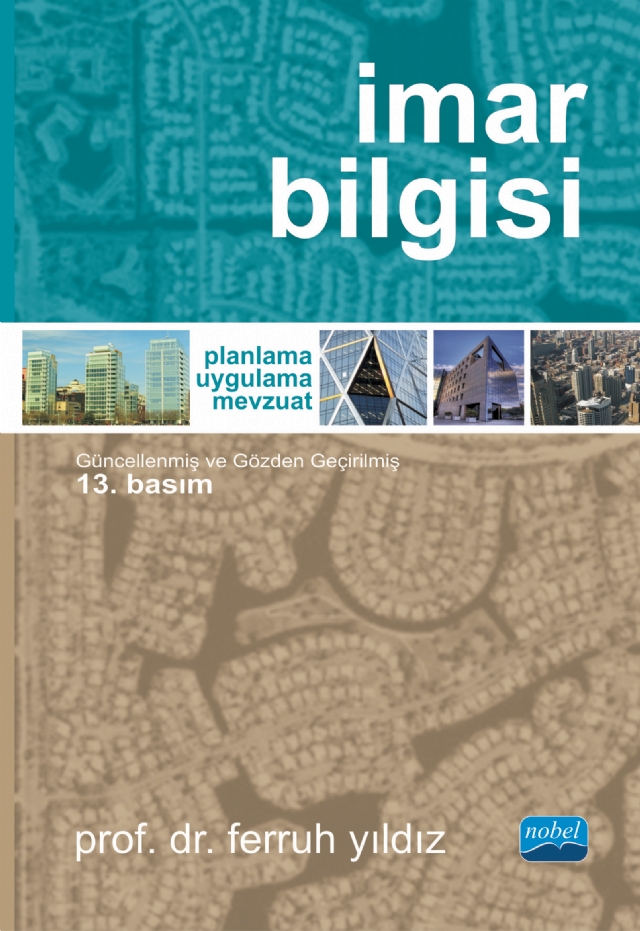
Many problems in today's cities; It is associated with poverty, inequality, pollution, unemployment, difficulties in accessing work, goods and services, low social cohesion, and poor quality of housing and other areas. On the other hand, city planning also has an impact on the social, economic and physical environments and the way cities operate.
In our country, there are more than 200 laws, statutes and regulations that directly or indirectly concern development activities. Therefore, more than 20 organizations at the national and regional level have authority as the implementer and supervisor of so many legislations. Here is one of the main reasons why an effective planning and implementation cannot be done in our country; It is the problem of institutionalization, coordination and lack of effective supervision caused by the structure of the existing planning system between the planning and implementation levels.
In this work; In parallel with the urbanization policies in our country, the necessary planning, implementation and legal bases have been tried to be given in order to produce the housing and residential environment of sufficient quality that the population needs.
In our country, there are more than 200 laws, statutes and regulations that directly or indirectly concern development activities. Therefore, more than 20 organizations at the national and regional level have authority as the implementer and supervisor of so many legislations. Here is one of the main reasons why an effective planning and implementation cannot be done in our country; It is the problem of institutionalization, coordination and lack of effective supervision caused by the structure of the existing planning system between the planning and implementation levels.
In this work; In parallel with the urbanization policies in our country, the necessary planning, implementation and legal bases have been tried to be given in order to produce the housing and residential environment of sufficient quality that the population needs.

There are many attempts to define the nature of man. The most common and almost agreed upon among these attempts is that man is a political creature. Man is a being who lives in a community, makes sense and establishes himself in a community. However, the transformation of this obligatory union of people into a good and fair system poses an important problem. Various political systems have been developed throughout history to establish and maintain such a social order. One of the most important and urgent problems facing humanity today is the formation of a good, beneficial and just order for everyone.
This work has been prepared in order to draw a theoretical framework for Islamic political thought by using the possibilities and tools of contemporary political science and political philosophy.
This book, which includes 11 articles written by competent academics in the field, aims to provide new expansions of classical origin to Islamic political thought, which has been shaped by Western influence in the modern period. For this reason, it aims to systematically address ancient issues in a conceptual continuity and thus to bring Islamic political thought to the present.
This work has been prepared in order to draw a theoretical framework for Islamic political thought by using the possibilities and tools of contemporary political science and political philosophy.
This book, which includes 11 articles written by competent academics in the field, aims to provide new expansions of classical origin to Islamic political thought, which has been shaped by Western influence in the modern period. For this reason, it aims to systematically address ancient issues in a conceptual continuity and thus to bring Islamic political thought to the present.
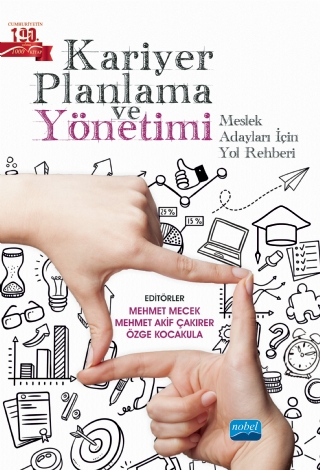
Career planning refers to the strategy one uses to set career goals and the ways to reach those goals. Having a career plan is critical for candidates who want to be successful not only in business but in all areas of life. Career planning is a multi-stage process in which career stages must be comprehensively addressed and executed in order for the candidate to achieve the success they want to achieve. With career planning, the candidate will have the chance to think in advance about alternative ways and routes for his future professional life, so that he will be able to construct his career journey on a “scenario-based” basis. A thoughtful career plan will both shape social life and provide a roadmap for the professional future. Thus, it will be possible to make informed choices about current job opportunities and potential future career opportunities. This book has been prepared with the contributions of expert academics, aimed at candidates, academics and professionals in business life who are looking for a guide both to see the current opportunities in their career journey and to explore potential career opportunities in the future. In each section, besides theoretical information, success stories of real people in their career journeys, advisory opinions given by experts in the field to candidates related to the subject, and additional reading suggestions for readers who want to deepen in the relevant section, as well as movie recommendations are given. We wish you a pleasant reading, hoping that it will be a useful guide for all readers.

“Ancient cities, medieval cities and modern cities, cities in capitalist countries, cities in socialist countries, and cities in Third World countries—all of these were within our broad intellectual framework. The resulting urban sociology could be anything you can think of, if you knew it was happening in cities. If you could see it, then you could see it discussed elsewhere in the literature of urban sociology." Saunders, R (2013). Social theory: Urban sociology (S. Bring Right, Trans.). Ideal Culture Publishing.
The construction of the city and the spread of cities to almost every corner of the world has been one of the most successful human creations of all time. Although it is very difficult to make a classification about the city and urban studies, which has been discussed in many ways, associated with different disciplines and has a rich literature written on it, the framework of this book covers a broad perspective from demography to the phenomenon of urbanization, from rural practices to the process of squatting, from social mobility to migration studies. and developed incrementally.
Introduction to Urban Studies aims to illuminate the dynamics of the past and present by approaching, step by step, the issues of city, dirt and migration, which still remain important and do not fall off the agenda. This work, which can be used by both those who are interested in urban studies and experts, is important in terms of being a starter book and creating integrity in the academic context.
The construction of the city and the spread of cities to almost every corner of the world has been one of the most successful human creations of all time. Although it is very difficult to make a classification about the city and urban studies, which has been discussed in many ways, associated with different disciplines and has a rich literature written on it, the framework of this book covers a broad perspective from demography to the phenomenon of urbanization, from rural practices to the process of squatting, from social mobility to migration studies. and developed incrementally.
Introduction to Urban Studies aims to illuminate the dynamics of the past and present by approaching, step by step, the issues of city, dirt and migration, which still remain important and do not fall off the agenda. This work, which can be used by both those who are interested in urban studies and experts, is important in terms of being a starter book and creating integrity in the academic context.

This study explains the Egyptian leg of the popular uprisings that affected the entire Arab geography in 2011 in the context of revolution theories and civil-military relations. In this context, while examining the critical role of the Egyptian army in the political system, the revolutionary conditions leading to the January 25 Tahrir revolution and the counter-revolutionary conjuncture leading to the July 3 military coup are discussed.
The conceptual framework of the study examined how the phenomenon of revolution developed historically; He conveyed the findings of thinkers who compared different examples of revolution, and discussed the necessary conditions for revolution and counter-revolution. Within the framework of the analysis, the dictatorship was overthrown with the January 25 revolution in Egypt; It has been observed that political and social relations have been formatted in favor of large sections of them within the framework of the new constitution.
On the other hand, the extensions of the old regime, whose interests were damaged by the revolution, started the counter-revolution process; While the revolutionary forces were polarized as secular and Islamist, it was determined that the alliance of the secular sectors with the counter-revolutionary forces gave birth to the July 3 coup.
As a result, after the military coup in Egypt, while the old regime elements were at the center of the political system, the old revolutionary liberal-secular wing was excluded; With the 2014 constitution in which freedoms were restricted, it was seen that the military dictatorship was institutionalized in the country and it was moving towards an unknown future.
The conceptual framework of the study examined how the phenomenon of revolution developed historically; He conveyed the findings of thinkers who compared different examples of revolution, and discussed the necessary conditions for revolution and counter-revolution. Within the framework of the analysis, the dictatorship was overthrown with the January 25 revolution in Egypt; It has been observed that political and social relations have been formatted in favor of large sections of them within the framework of the new constitution.
On the other hand, the extensions of the old regime, whose interests were damaged by the revolution, started the counter-revolution process; While the revolutionary forces were polarized as secular and Islamist, it was determined that the alliance of the secular sectors with the counter-revolutionary forces gave birth to the July 3 coup.
As a result, after the military coup in Egypt, while the old regime elements were at the center of the political system, the old revolutionary liberal-secular wing was excluded; With the 2014 constitution in which freedoms were restricted, it was seen that the military dictatorship was institutionalized in the country and it was moving towards an unknown future.
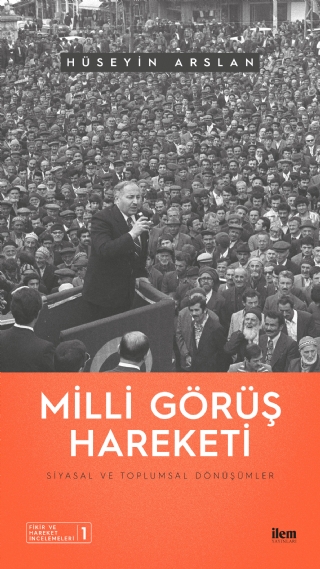
The book Milli Gorus Movement: Political and Social Transformations is an analysis of a movement that left its mark on the political history of Turkey and became the catalyst for social transformation. The Milli Gorus movement, which started with the entry of Necmettin Erbakan into politics in 1969, marks a turning point for Turkish political life and Islamist thought.
The history of Turkey cannot be analyzed clearly without considering the National Vision movement, which is the core of many social structures, institutions and political parties that still affect Turkish politics today.
With the "Idea and Movement Studies" series, it is aimed to present a framework and an original view on the main names, journals and issues that reflect the intellectual accumulation of Islamism and appear in almost every field. The books to be included in the series cover topics that are curious in different fields of Islamist thought. In this framework, it is aimed to contribute to the understanding of the issues on a basic and introductory level.
The history of Turkey cannot be analyzed clearly without considering the National Vision movement, which is the core of many social structures, institutions and political parties that still affect Turkish politics today.
With the "Idea and Movement Studies" series, it is aimed to present a framework and an original view on the main names, journals and issues that reflect the intellectual accumulation of Islamism and appear in almost every field. The books to be included in the series cover topics that are curious in different fields of Islamist thought. In this framework, it is aimed to contribute to the understanding of the issues on a basic and introductory level.
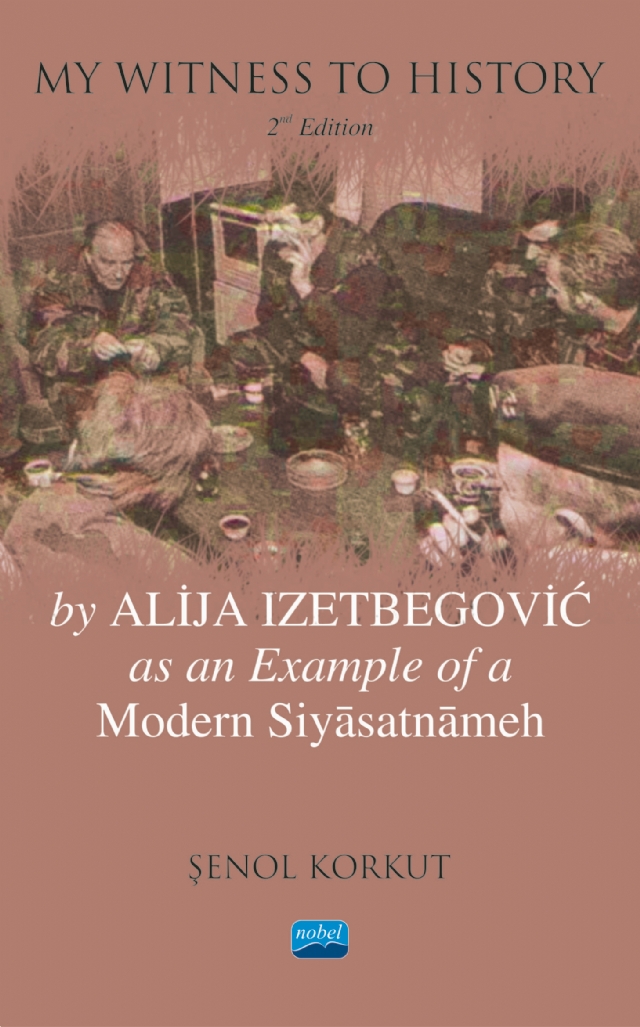
This book, subjects the basic dynamics of the Muslims of Bosnia and Herzegovina to a new reading through the memories of Alija Izetbegović (1925-2003), one of the most important Muslim intellectuals of the twentieth century. Izetbegović's pursuit of truth in his childhood and youth and his attitude towards the ideologies around him are taken in terms of the way a Muslim intellectual was brought up in the modern world. In the second part of the study, the importance of the Islamic Declaration for the current Islamic world, how to keep the Muslim identity alive under all conditions and the Islamic method to be developed for the policies of dimming the Muslim identity are examined. In the third part of the study, the importance of a Muslim party on the basis of the SDA and the principles to be derived from the struggle for existence during the Bosnia-Herzegovina war were examined. In the last part of the study, the current situation in Bosnia and Herzegovina after Dayton is discussed. The book seeks to construct a modern Siyāsatnāmeh based on the memories of Izetbegović.

Throughout history, Turkish-Russian relations have been one of the main elements, probably the most important, of the general view of the Eurasian region and the balance of power in this geography. This important rivalry, which started with the relations between the Ottoman Empire and the Russian Tsardom, at first tended to gain the appearance of cooperation after the establishment of the Soviet Union. With the World War II, this time it showed itself with the effect of an ideological separation. After the collapse of the Soviet Union, although there is no direct land border between Turkey and the Russian Federation, the intensity of relations between the parties has not decreased; on the contrary, due to Turkey's relationship with the Caucasus and Central Asian Turkic republics, it has gained even more importance.
There is a need for a better understanding of Russia in our country in order to better understand this new relationship ground, which often emerges as conflict/competition and sometimes as common understanding/cooperation. This academic study in your hand is of a quality that sheds light on our understanding of Russia's present and future, which takes its place in this dilemma from the point of view of Russia. Author Prof. Dr. In his work, Mesut Hakkı Caşın also uses the historical background and brief flashbacks necessary for a better understanding of this period, while trying to analyze the situation in the Russian Federation that emerged after Vladimir Putin became President. With these features, the study is a useful contribution to the efforts we feel lacking regarding Russia.
There is a need for a better understanding of Russia in our country in order to better understand this new relationship ground, which often emerges as conflict/competition and sometimes as common understanding/cooperation. This academic study in your hand is of a quality that sheds light on our understanding of Russia's present and future, which takes its place in this dilemma from the point of view of Russia. Author Prof. Dr. In his work, Mesut Hakkı Caşın also uses the historical background and brief flashbacks necessary for a better understanding of this period, while trying to analyze the situation in the Russian Federation that emerged after Vladimir Putin became President. With these features, the study is a useful contribution to the efforts we feel lacking regarding Russia.

The Middle East, which has been a center of attraction in every period of history due to its rich oil and natural gas deposits and being the center of monotheistic religions, is an unfortunate geography that has witnessed conflicts and wars in every period as a natural consequence of these characteristics. Factors such as power or prosperity revealed by classical approaches are insufficient to explain the events in international relations in the Middle East. Therefore, the internal dynamics of the region should be known very well. One of the most important internal dynamics in explaining the events in the region is the understanding of "Salaf" religion. This book explains the reasons for the events and conflicts in the Middle East by giving answers to questions such as what Salafism is, how it emerged, what historical processes it has reached today, what its types are, how it affects the people living in the region, events and international relations.

Throughout history, the Middle East has never lost its charm due to its strategic location and the political and economic expectations of global powers. The Middle East, which experienced a stable period during the rule of the Ottoman Empire (1517-1917), first came under the control of England and France with the disintegration of the Ottoman Empire at the end of the First World War, and then the USSR and the USA during the "Cold War" Period. It has been a field of contention in the political and military fields of the United States.
This second book, which was prepared as a continuation of the previous book "Middle East Perspective I", sheds light on the history of the Middle East, again with the contributions of many academicians, on the political, military and economic events experienced by the Middle East countries in the historical process.
This second book, which was prepared as a continuation of the previous book "Middle East Perspective I", sheds light on the history of the Middle East, again with the contributions of many academicians, on the political, military and economic events experienced by the Middle East countries in the historical process.

Although it is noteworthy that one of the cornerstones necessary to understand and make sense of the Middle East after the 2011 Arab uprisings is the relationship between politics and religion in the region, the importance of the issue is increasing day by day. As academics in Turkey, we tried to deal with the developments in the region and the background of the events.
As part of the ILEM Islamic Political Thought Project, we held a series of seminars under the heading "Politics and Religion in the Middle East". Our aim was to try to understand the politics-religion relationship in the region through different religious and political schools. In 2017, we tried to deal with issues in a different spectrum, from the origins of the two main currents in the region, $ii and Sunni political thoughts, to today's political reflections. Of course, the issues we deal with are neither limited to the seminars nor as they appear in the book; has much broader extensions. Nevertheless, we tried to produce a comprehensive and representative work.
As part of the ILEM Islamic Political Thought Project, we held a series of seminars under the heading "Politics and Religion in the Middle East". Our aim was to try to understand the politics-religion relationship in the region through different religious and political schools. In 2017, we tried to deal with issues in a different spectrum, from the origins of the two main currents in the region, $ii and Sunni political thoughts, to today's political reflections. Of course, the issues we deal with are neither limited to the seminars nor as they appear in the book; has much broader extensions. Nevertheless, we tried to produce a comprehensive and representative work.
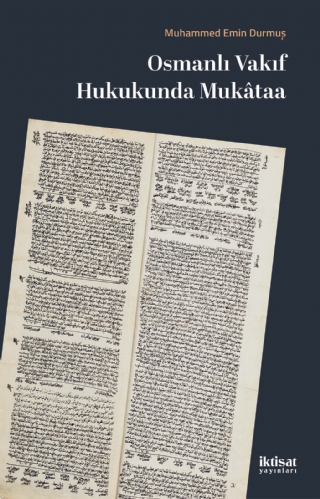
The concept of mukâtaa is used to express practices that have different legal consequences in foundation law, as in Ottoman financial law. In this study, the focus is mainly on the practice of mukataa, which means renting the foundation land to anyone who wants to build a building or plant a tree, with the right of decision and ownership of it. The foundations of the mukâtaa practice date back to before the Ottoman Empire, and the Ottomans further developed this practice, which they inherited, with some arrangements and used it for centuries. However, Ottoman lawyers, who saw that the mukâtaa practice caused the abuse of foundations over time, did not insist on this practice, on the contrary, they developed the more advantageous icâreteyn practice for foundations. This shows that mukataa paved the way for the practice of icareteyn. In this book, the historical background, nature, different practices, conditions, legal principles and rights of the mukataa contract in the 16th and 17th centuries have been tried to be revealed, especially based on fatwa journals and sharia registers.

Official correspondence, speeches and meetings in public and corporate life (business environment), meetings, ceremonies and ceremonial events; invitations, visits and banquets; official business, transactions and activities are carried out in accordance with the protocol and social behavior rules as form and method. Therefore, knowing and obeying the protocol and social behavior rules is important and necessary in terms of representation and reputation. Because people and institutions who know the protocol and social behavior rules, obey these rules and apply them are always appreciated and preferred in public and social life.
The aim of the book is to provide all students studying at universities, all managers working in public institutions and private institutions (businesses), executive candidates, executive assistants, experts, all officials who are at the point of contact with the public and provide services to the public, to gain protocol knowledge and skills that they will use in their management, business and social lives. enable them to apply this knowledge successfully; thus increasing their success, effectiveness and prestige at individual, institutional, national and international levels.
This book has been prepared in accordance with the Protocol and Social Behavior Rules curriculum taught in the Office Management and Executive Assistant Vocational Schools of universities.
The aim of the book is to provide all students studying at universities, all managers working in public institutions and private institutions (businesses), executive candidates, executive assistants, experts, all officials who are at the point of contact with the public and provide services to the public, to gain protocol knowledge and skills that they will use in their management, business and social lives. enable them to apply this knowledge successfully; thus increasing their success, effectiveness and prestige at individual, institutional, national and international levels.
This book has been prepared in accordance with the Protocol and Social Behavior Rules curriculum taught in the Office Management and Executive Assistant Vocational Schools of universities.